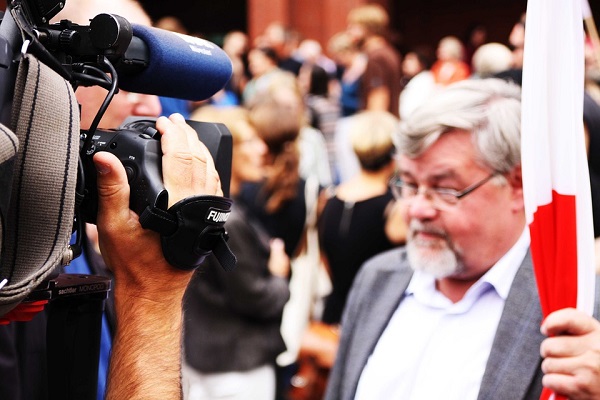For beginners in journalism or photography, the press pass (aka photo pass or media pass) can seem like some far-off challenge reserved for established professionals. After all, who are you to get free access to events and a chance to get up close and personal with performers? But, that’s just your insecurity talking.
The truth is that it’s not all that difficult to get a press pass to cover an event. This article will take you through the steps for getting your very own pass, including a template to use for contacting performers or their publicists. Everyone starts somewhere, and the key to success lies partly in acting like a professional before you feel like one. To do that, you need this information.
This One Thing Matters Most
When you’re starting out, it can be hard to feel qualified to apply for press passes. This is where building up your portfolio comes into play. Before you start attending the kind of events that require a press pass, you may want to start covering events at bars or entertainment performed in public places—where you won’t need special access.
Of course, even at this stage, it’s a good idea to talk to the performers beforehand, especially at indoor locales. Let them know how you plan to use the images or interview material, and you may just start a working relationship with the performers that builds into something bigger in the future. The portfolio and your networking efforts establish your early credentials as a professional.
However, when it’s time to apply for the press pass, one thing becomes more important than who you are and what venues you’ve covered before—your publication credentials. That is, you must be able to supply the name of the publication you are reporting for or shooting photos for. If you are not “with the press”, you will not get a press pass.
If you are a freelancer, perhaps you wonder how you’ll ever get a press pass if you don’t work for a publication. It’s easy. You use that portfolio and your network to find publications that hire freelancers. You can then get your media pass through your affiliation working with that publication. You needn’t be a full-time employee.
What is absolutely essential is that you can provide the name of your contact at a reputable publication when asking for a pass. If you are taking photos or writing for your own blog or small publication, be sure to provide a link to your website or some other evidence that you are legitimate and have a developed audience.
Steps for Getting a Press Pass
First thing’s first. You need to know who to contact. Typically, the artist’s publicist or manager is the person to reach out to. Less likely, and usually for smaller events, you may need to contact the artist directly. You can also try to contact the event promoter; however, the promoter typically provides press passes to the artists team as part of their contract. Contacting the promoter may mean extra steps for you because you’ll still need authorization from the artist or their publicist to get an interview or special photo opportunities.
How do you find contact information for the person you need to ask? You can utilize our database to get the celebrity contact info for the celebrity including their management and publicist. If it’s a big event like a festival, you can go to the event website and look for a link to the press office, public affairs, or public relations. That should get you to the contact information for the right person.
Once you’ve found your contact person, follow these steps to acquire your pass:
-
- Get your assignment. Before you even think about contacting the event promoter, you need to know where your images or writing will be used. If you’re freelancing, you must have an assignment before getting a press pass. Why? Because the first thing an event organizer will want to know is which publication you are working with.
-
- Make contact early. Many events give out only a limited number of press passes, so that means you should get yours as soon as possible. To be a professional, you need to keep on top of event schedules. Devise some sort of calendar, schedule, or other system for keeping track of event dates. Bandsintown is a good resource to use to track tour dates for specific artists.
- Compose an email. Most of the time, press passes are arranged through email communications. Since you’re probably going to be asking for passes often, it’s a good idea to develop a template you can use for these situations. It will save you time and ensure that you don’t leave out important information. I’ve provided a sample template below that you are free to use.
That’s really all there is to it. As far as a template for your request, I’ve taken a cue from Suzi Pratt, who suggests keeping your message short and to the point:
Hello,
I’m a journalist who writes and/or takes photos for (name of publication). I’m contacting you about applying for a press pass for (name of event) in (month of event). The material would be published on (estimated date of publication).
I have experience covering (dozens/hundreds/insert your relevant experience) of concerts, and you can view samples of my work on my web portfolio:
https://YourURL.com
I’m happy to provide any additional information you might require. Thank you for your consideration!
Regards,
(Your Name)
Insider Tips
Be polite and form relationships with performers, promoters, and other photographers or journalists. Even if you get denied a pass, it pays to keep your composure. You never know when you may be asking for a pass from the same person again, and you don’t want to be remembered as the reporter who threw a fit.
Act like a professional, even if you’re a newbie. The most important part of this is conveying how you will provide benefit to the venue and performers. If you’re just covering the event as a hobby, you’re not going to get a press pass. So, don’t come across as a hobbyist.
Don’t expect to show up the night of the performance and talk your way into getting a pass. You need to ask for your pass well in advance, often months ahead of the event. Also, the people who handle passes may not even be at the actual performance.
However, do show up early for events you get a media pass for. Remember, the performer’s publicist (or whoever authorized your access) has been kind enough to let you into the event for free. Arrive on time to be respectful of other members of the press and to the performers if they agreed to give you an interview before the event. Who knows, arriving early may just give you a chance to get some rare opportunities you would have otherwise missed out on.
Bring a printout of your email correspondence to the Will Call booth as evidence of who gave permission for you to have a press pass. Or, you can write down the name and phone number of the contact who authorized your access. You may be asked to provide this information the night of the show.
After the show, follow up with the person who granted you access. Send them a copy of the article where your material was used. This small gesture builds your reputation as a reliable person to work with and shows the publicist that you are a legitimate professional.
The Advice You Don’t Want to Hear
Keep in mind that it’s common to get a “no” when applying for a press pass. Some venues simply hire their own photographers and writers, so don’t take it personally. Do your research and keep trying. The more feelers you put out in the industry, the more success you’ll develop for yourself.






